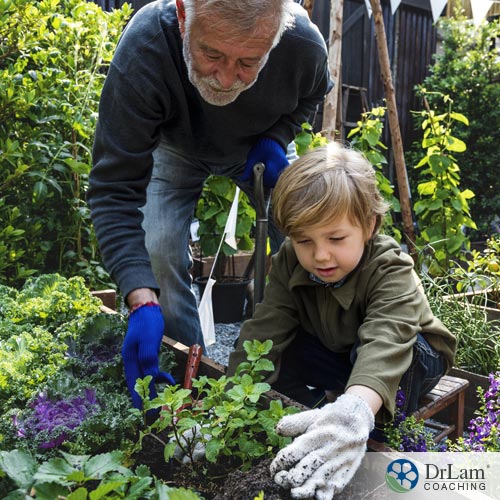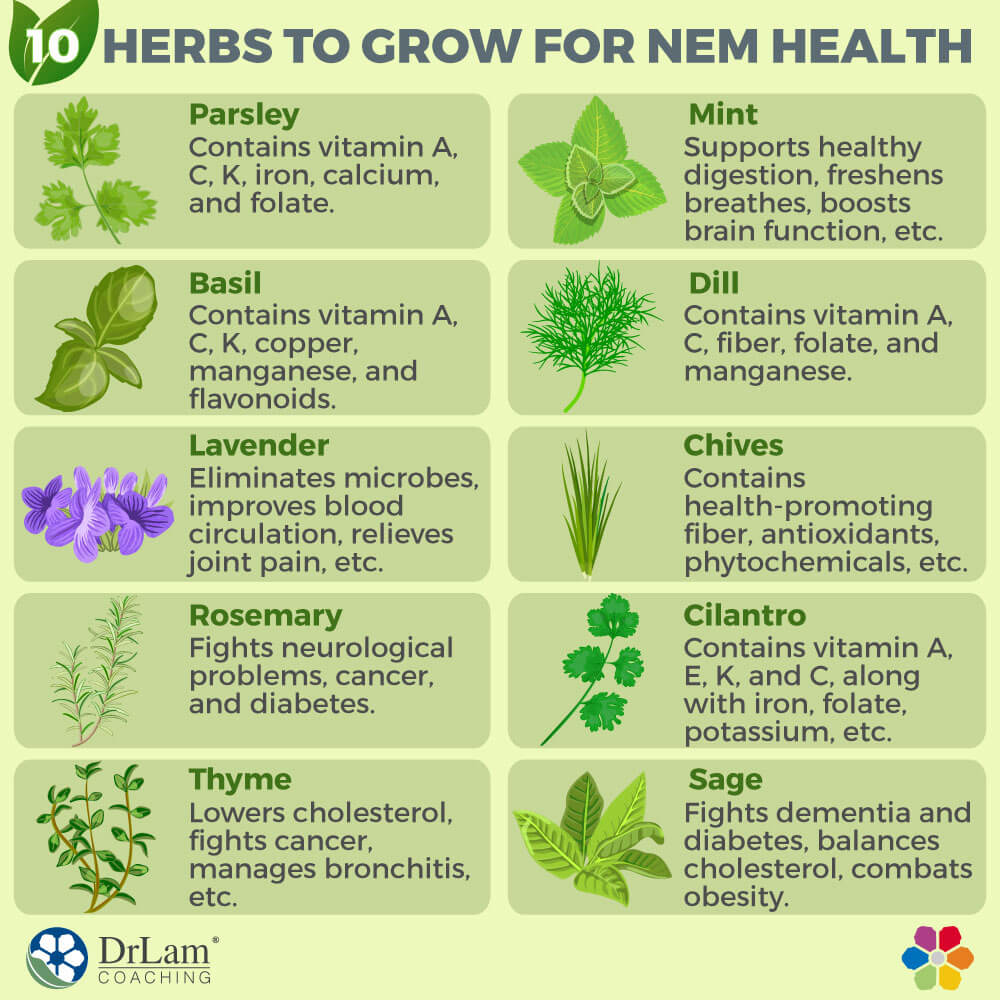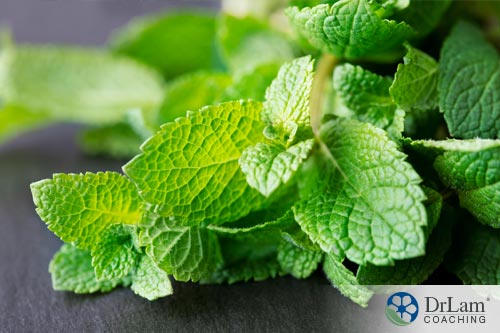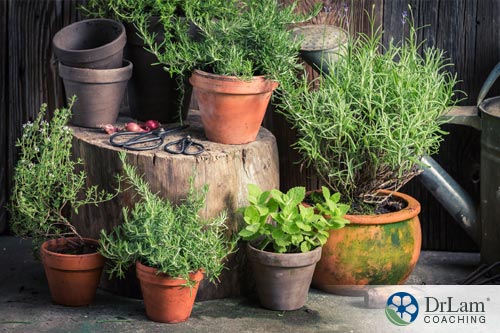 Having an aromatic kitchen garden is easy. All you need to do is plant healthy herbs. Not enough space for gardening? Herbs can also be grown easily in small pots on your window sill. Growing your own herbs can be a fun, exciting, and rewarding experience. They can be added to your recipes, incorporated in DIY aromatherapy, or used as a natural room freshener. Explore these aromatic herbs that you can easily grow at home and their healing properties.
Having an aromatic kitchen garden is easy. All you need to do is plant healthy herbs. Not enough space for gardening? Herbs can also be grown easily in small pots on your window sill. Growing your own herbs can be a fun, exciting, and rewarding experience. They can be added to your recipes, incorporated in DIY aromatherapy, or used as a natural room freshener. Explore these aromatic herbs that you can easily grow at home and their healing properties.
Healthy herbs, incorporated into your meals and around your home, can help your body deal with some of the most prevalent problems of our time - the effects of stress.
Foods high in pesticides end up in your system causing toxic overload. You have a stressful day, or an argument with a loved one, or financial problems on your mind. All this can exert stress on your body.
Your body is equipped with NeuroEndoMetabolic (NEM) Stress Response system to deal with stress through six circuits of organs and systems. A pair of walnut-shaped adrenal glands located above your kidneys is also an important part of the stress response system.
When a stressful situation arises, the NEM signals your adrenals to secrete the anti-stress hormone cortisol to deal with the stress. When stress continues for a longer period, however, more cortisol is required to deal with the situation. This can overburden your adrenals until they become unable to secrete adequate cortisol. As a result, your body’s natural stress-fighting ability reduces which can lead to adrenal fatigue.
 When you frequently experience extreme fatigue along with symptoms like anxiety, insomnia, low energy levels, difficulty waking up, constipation, low concentration levels, stubborn weight gain, craving for salty and fatty foods, and brain fog then you could have Adrenal Fatigue Syndrome (AFS).
When you frequently experience extreme fatigue along with symptoms like anxiety, insomnia, low energy levels, difficulty waking up, constipation, low concentration levels, stubborn weight gain, craving for salty and fatty foods, and brain fog then you could have Adrenal Fatigue Syndrome (AFS).
To recover from the condition it is important to give your adrenals adequate time to heal naturally and to follow adrenal fatigue recovery protocols. Eating a nutrient-rich diet, mildly detoxing your body, and minimizing stressors are crucial tools to successful adrenal fatigue recovery.
Home-grown, pesticide-free herbs added to your meals or teas can soothe your stressed system, add nutrients to your diet, and offer many gentle healing properties. Aromatic herbs also have healing, soothing, and therapeutic properties that can help boost your adrenal health.
Here is how having healthy herbs can help you heal from stress. Healthy herbs can:

Homegrown herbs are loaded with vitamins, antioxidants, minerals, essential oils, and dietary fiber, along with anti-inflammatory and anti-bacterial properties. They can also be natural insect repellents and natural detoxifying agents.
Here is a list of healthy herbs that can be easily grown at your home:
Parsley enhances the flavor of recipes. This flavorful herb contains vitamin A, C, K, iron, calcium, and folate. In fact, just a teaspoon of parsley can help meet your daily recommended vitamin K intake. Parsley can be easily grown at your home with little sunlight and maintenance.
This versatile healthy herb is loaded with therapeutic properties and can be easily grown indoors or out. It contains vitamin A, C, K, copper, manganese, and flavonoids. Whether you are looking to ease inflammation, detoxify your body, or remove skin blemishes, basil is the herb you need. It helps to calm your nerves, boosts immunity, supports cardiovascular health, fights depression, and promotes gut health. Basil can also help detoxify the liver for successful adrenal fatigue recovery. Consider adding basil to your casseroles, soup, and broth. Basil also works as a natural insect repellent.
Pretty and fragrant, lavender is best grown outdoors in well-drained soil and with ample sunlight. Owing to its soothing fragrance and stimulating and calming properties, lavender finds extensive application in aromatherapy. Lavender oil is known to help promote hair growth. Clinical trials suggest that a blend of lavender and other essential oils can help alopecia areata. The herb is also used in the preparation of cosmetic products such as shampoos, soaps, and hand wash. Lavender essential oil helps eliminate microbes, improves blood circulation, relieves joint pain, promotes wound healing, and relieves respiratory disorders.
Rosemary has been used in healing, disease-prevention, and cooking for thousands of years. A blend of rosemary and lavender essential oil, when massaged on the skin, has been known to have a soothing and calming effect on the brain, thus relieving stress and fatigue. Studies show that rosemary can help fight neurological problems, cancer, and diabetes. The powerful healing compounds in rosemary have remarkable healing powers and enhance longevity. This sweet smelling healthy herb grows best with frequent watering under full sunshine. Rosemary tastes great on your roasted vegetables.
Loaded with remarkable medicinal properties, thyme supports a healthy body and mind. Its antimicrobial property helps fight sore throat. This herb is also known to lower cholesterol and blood pressure, fight cancer, manage bronchitis, and reduce food poisoning. Studies show that thyme can help boost mood by enhancing the secretion of hormones such as serotonin and dopamine. Thyme adds a great flavor to almost any dish including salad and soup. The plant can be easily grown indoors due to its small size.
 Mint is one of the easiest herbs to grow at your home. This aromatic, refreshing herb grows fast and well and is extensively used in worldwide cuisine. Just two tablespoon of mint can help meet your daily vitamin A intake. The herb supports healthy digestion, freshens breathes, boosts brain function, promotes oral health, and relieves colds. Make a refreshing mint tea or sprinkle the herb on rice dishes, salads, and soup for enhanced flavor.
Mint is one of the easiest herbs to grow at your home. This aromatic, refreshing herb grows fast and well and is extensively used in worldwide cuisine. Just two tablespoon of mint can help meet your daily vitamin A intake. The herb supports healthy digestion, freshens breathes, boosts brain function, promotes oral health, and relieves colds. Make a refreshing mint tea or sprinkle the herb on rice dishes, salads, and soup for enhanced flavor.
For centuries, dill has been used in food and medicinal preparations. The herb contains vitamin A, C, fiber, folate, and manganese. It is known to possess antidepressant and antimicrobial properties. The fatty acids found in dill helps improve digestion and enhance energy. Studies show that dill can help reduce menstrual cramps, fight epilepsy, and protect against free radical damage. Dill can be added to almost any dish. The herb can be grown both indoors and out.
This fragrant and evergreen healthy herb with a subtle onion-garlic flavor goes well with savory dishes such as baked potatoes and green salad. Chives contain health-promoting fiber, antioxidants, phytochemicals, calcium, magnesium, zinc, riboflavin, and phosphorus. The various health benefits of chives include healthy digestion, protection against free radicals, reduced blood pressure, and protection against certain types of cancer. These herbs grow easily indoors.
This popular healthy herb goes well with almost any dish. It is a good source of vitamin A, E, K, and C, along with iron, folate, potassium, magnesium, and calcium. Studies show that cilantro can help your body get rid of heavy metals. The herb contains antioxidant properties which help fight against the damage of free radicals. The natural sedative effect of cilantro helps calm the brain, lower anxiety, and improve sleep which can prove helpful in adrenal fatigue. The herb also helps boost heart health, lower blood sugar levels, and prevent urinary tract infections.
Sage has been used for centuries in the preparation of ancient medicines for pain, swelling, diarrhea, indigestion, and menstrual pain. Including sage in the diet helps fight dementia, balances cholesterol, combats obesity, and fights diabetes. The herb goes well in roasted dishes and dressings. It is also used as a natural remedy for fatigue and anxiety. Sage grows best in well-drained soil and full sunlight.
 Homegrown herbs are high in nutrition, antioxidants, essential oils, and therapeutic properties. Some of the best healthy herbs that you can easily grow at your home include parsley, basil, lavender, rosemary, thyme, mint, dill, chives, cilantro, and sage. The natural essential oils, vitamins, minerals and antioxidants in herbs helps aid digestion, detoxifies the body, restores adrenal health, minimizes stress, reduces fatigue, boosts immunity and cardiovascular health, improves oral health, fights inflammation, clears skin blemishes, and improves memory. However keep in mind that adrenal fatigue sufferers can be very sensitive even to herbs, so it’s important to consult an experienced practitioner or nutritionist to see if these herbs are right for you.
Homegrown herbs are high in nutrition, antioxidants, essential oils, and therapeutic properties. Some of the best healthy herbs that you can easily grow at your home include parsley, basil, lavender, rosemary, thyme, mint, dill, chives, cilantro, and sage. The natural essential oils, vitamins, minerals and antioxidants in herbs helps aid digestion, detoxifies the body, restores adrenal health, minimizes stress, reduces fatigue, boosts immunity and cardiovascular health, improves oral health, fights inflammation, clears skin blemishes, and improves memory. However keep in mind that adrenal fatigue sufferers can be very sensitive even to herbs, so it’s important to consult an experienced practitioner or nutritionist to see if these herbs are right for you.
Growing your own healthy herbs at home is easy, but certain herbs such as mint grow rapidly. You can always dry mint leaves and store them for adding to your dishes, chai mix, and DIY beauty recipes. All you need to do is pick herbs from the plant and allow them to dry on a plate under natural sunlight. You may also dry the herbs using a dehydrator or microwave oven.
